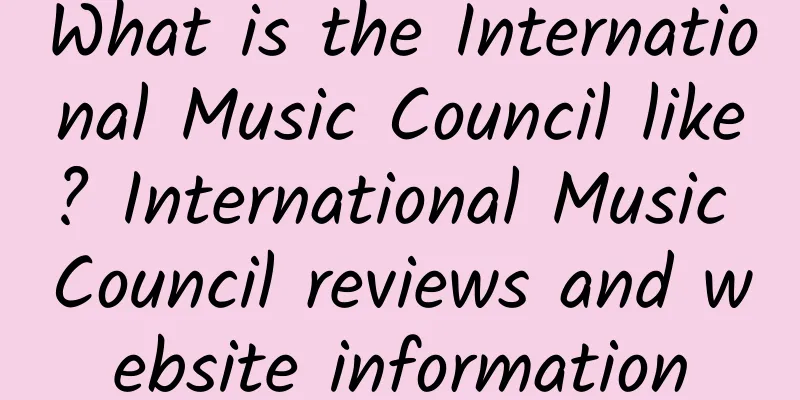International Music Council: Guardian and promoter of global music culture
The International Music Council (IMC) is the world's most authoritative non-governmental international music organization. Since its establishment in 1949, it has been committed to promoting the dissemination and exchange of global music culture. As an important partner of UNESCO, IMC plays an irreplaceable role in promoting music education, protecting music diversity, developing the music industry, and improving the public's level of music appreciation. This article will discuss in detail the historical background, organizational structure, major activities, global influence and future development of IMC.
1. IMC’s historical background and founding purpose
The International Music Council was established in January 1949 and is headquartered in Paris, France. Its establishment can be traced back to the increasing demand for cultural reconstruction in countries around the world after the end of World War II. As a subsidiary of UNESCO, the establishment of IMC aims to promote cultural exchanges and understanding among countries through music, a universal language, and to promote world peace and development.
IMC's mission includes:
- Promote the dissemination and exchange of music culture among countries
- Protecting traditional music and musical diversity
- Promote the development of music education and music industry
- Improve the public's appreciation of music
Since its establishment, IMC has always adhered to these principles and has become an important driving force in the global music field by carrying out various international music activities, formulating industry standards, and providing professional guidance.
2. IMC’s Organizational Structure and Membership
The organizational structure of IMC includes the General Assembly, the Executive Committee and the Secretariat. The General Assembly is the highest decision-making body of IMC, composed of member representatives from all over the world, responsible for formulating the strategic direction and policies of IMC. The Executive Committee is responsible for overseeing the daily operations of IMC and ensuring that its activities are consistent with its purpose. The Secretariat is the administrative body of IMC, responsible for coordinating and managing various specific affairs.
IMC members include national music organizations, music education institutions, music industry companies, and individual musicians. As of 2023, IMC has members from more than 150 countries and regions, covering most important institutions and individuals in the field of music culture around the world. In 1979, the Chinese Musicians Association officially joined IMC and became its only representative organization in China, further promoting the exchange and cooperation of Chinese and Western music culture.
III. IMC’s main activities and projects
IMC promotes the development of global music culture through various projects and activities. The following are some of IMC's signature activities:
1. World Music Day
World Music Day is a global music celebration initiated by IMC, which aims to promote world peace and cultural diversity through the power of music. Every June 21st, musicians and music lovers around the world hold various forms of music events, including concerts, workshops, lectures, etc., to celebrate the diversity and inclusiveness of music.
2. International Music Education Forum
IMC regularly holds the International Music Education Forum, which brings together experts and practitioners in the field of music education from around the world to discuss the latest trends and challenges in music education. The forum covers the formulation of music education policies, innovation of teaching methods, and the practice of cross-cultural music education, providing valuable experience and guidance for the development of global music education.
3. Music Diversity Protection Plan
IMC is committed to protecting traditional music and endangered music cultures around the world through its Music Diversity Conservation Program. The project includes recording, organizing and archiving traditional music, supporting the inheritance and innovation of traditional musicians, and promoting the dissemination and development of traditional music in modern society.
4. Music Industry Promotion Program
IMC also supports the development of the global music industry through the Music Industry Promotion Program. The program aims to provide professional training and resource support for music industry practitioners, promote the digital transformation of the music industry, and promote the creation, distribution and promotion of music works.
4. IMC’s Global Influence
As the world's most authoritative music organization, IMC's global influence in the field of music cannot be ignored. Through close cooperation with UNESCO, IMC has played an important role in formulating international music policies, promoting the popularization of music education, and protecting musical diversity. IMC's activities and projects not only cover developed countries, but also benefit many developing countries and regions, making positive contributions to the balanced development of global music culture.
In addition, IMC has further expanded its influence through cooperation with other international organizations, such as the World Health Organization to use music to treat mental health problems, the International Labor Organization to improve the working conditions of music practitioners, and the United Nations Children's Fund to promote children's education through music.
V. Cooperation between IMC and China
Since the Chinese Musicians Association joined the IMC in 1979, the cooperation between China and IMC has become increasingly close. As the only representative organization of IMC in China, the Chinese Musicians Association actively participates in various activities of IMC and promotes the international dissemination of Chinese music culture. In recent years, the cooperation between China and IMC in the fields of music education, traditional music protection, and music industry development has achieved remarkable results.
For example, IMC has cooperated with the Chinese Musicians Association to hold several international music education forums, attracting music education experts and practitioners from all over the world, providing valuable experience and resources for the development of Chinese music education. In addition, IMC also supports China's protection and inheritance of traditional music, and helps Chinese musicians show the charm of Chinese traditional music on the international stage.
6. Future Development of IMC
Looking ahead, IMC will continue to be committed to promoting the development of global music culture. The following are several key development directions of IMC in the future:
1. Promote the digital transformation of music education
With the rapid development of digital technology, the form and content of music education are also constantly changing. IMC will promote the digital transformation of music education and use online courses, virtual reality technology and other means to provide more abundant and convenient learning resources for music learners around the world.
2. Strengthen the protection and innovation of musical diversity
IMC will continue to strengthen the protection of traditional music and musical diversity, while encouraging musicians to innovate on the basis of traditional music and promote the integration and development of traditional music and modern music.
3. Promote the sustainable development of the music industry
IMC will promote the sustainable development of the music industry, support the green transformation of the music industry, promote the fair trade and dissemination of music works, and create a more fair and sustainable development environment for music practitioners.
4. Expand exchanges and cooperation with global music culture
IMC will continue to expand exchanges and cooperation with global music culture, and promote mutual understanding and integration of music cultures of various countries by hosting international music events and establishing a global music network.
Conclusion
As the world's most authoritative music organization, the International Music Council has been committed to promoting the dissemination and development of global music culture since its establishment. By carrying out various international music activities, formulating industry standards, and providing professional guidance, IMC has played an important role in music education, music diversity protection, and music industry development. In the future, IMC will continue to uphold its purpose, promote the prosperity and progress of global music culture, and contribute the power of music to world peace and development.
For more information, please visit the official website of the International Music Council: www.imc-cim.org .










